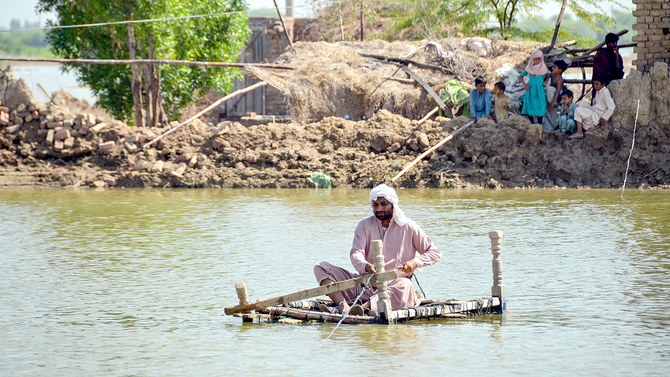ISLAMABAD: The World Bank said on Saturday it is “envisaging” financing of $2 billion for Pakistan to rehabilitate and restore people’s lives following devastating floods that have killed over 1,600 people in the country since mid-June.
Heavy monsoon rains in Pakistan triggered flash floods since June 14 that have destroyed crops in large quantities and dealt severe damage to the country’s infrastructure. The government estimates damages can run up to $40 billion and that over 33 million people have been affected by the floods.
Prime Minister Shehbaz Sharif, during his recent visit to the United Nations General Assembly (UNGA) met representatives of the International Monetary Fund (IMF) and the World Bank. On Saturday, World Bank’s Vice President for South Asia region, Martin Raiser, concluded his first official trip to Pakistan.
During his two-day visit to the country, Raiser met key Pakistan government officials including Finance Minister Miftah Ismail, Planning Minister Ahsan Iqbal, the governor of Pakistan’s central bank and others. He reiterated the World Bank’s commitment to supporting Pakistan during these critical times.
“As immediate response, we are repurposing funds from existing World Bank-financed projects to support urgent needs in health, food, shelter, rehabilitation, and cash transfers,” Raiser was quoted as saying in a World Bank press release.
Raiser said the World Bank is working with Pakistan’s federal and provincial authorities to quickly start infrastructure reconstruction and rehabilitation and rebuild people’s homes and restore their livelihoods.
He said Pakistan and the World Bank were also working to strengthen the country’s resilience to climate-induced disasters. “We are envisaging financing of about USD 2 billion to that effect,” Raiser added.
The World Bank official visited Pakistan’s southern Sindh province where he met Chief Minister Murad Ali Shah. Raiser undertook a visit to the province’s Dadu district to survey the extent of the damages and met affected households at a relief camp there.
















